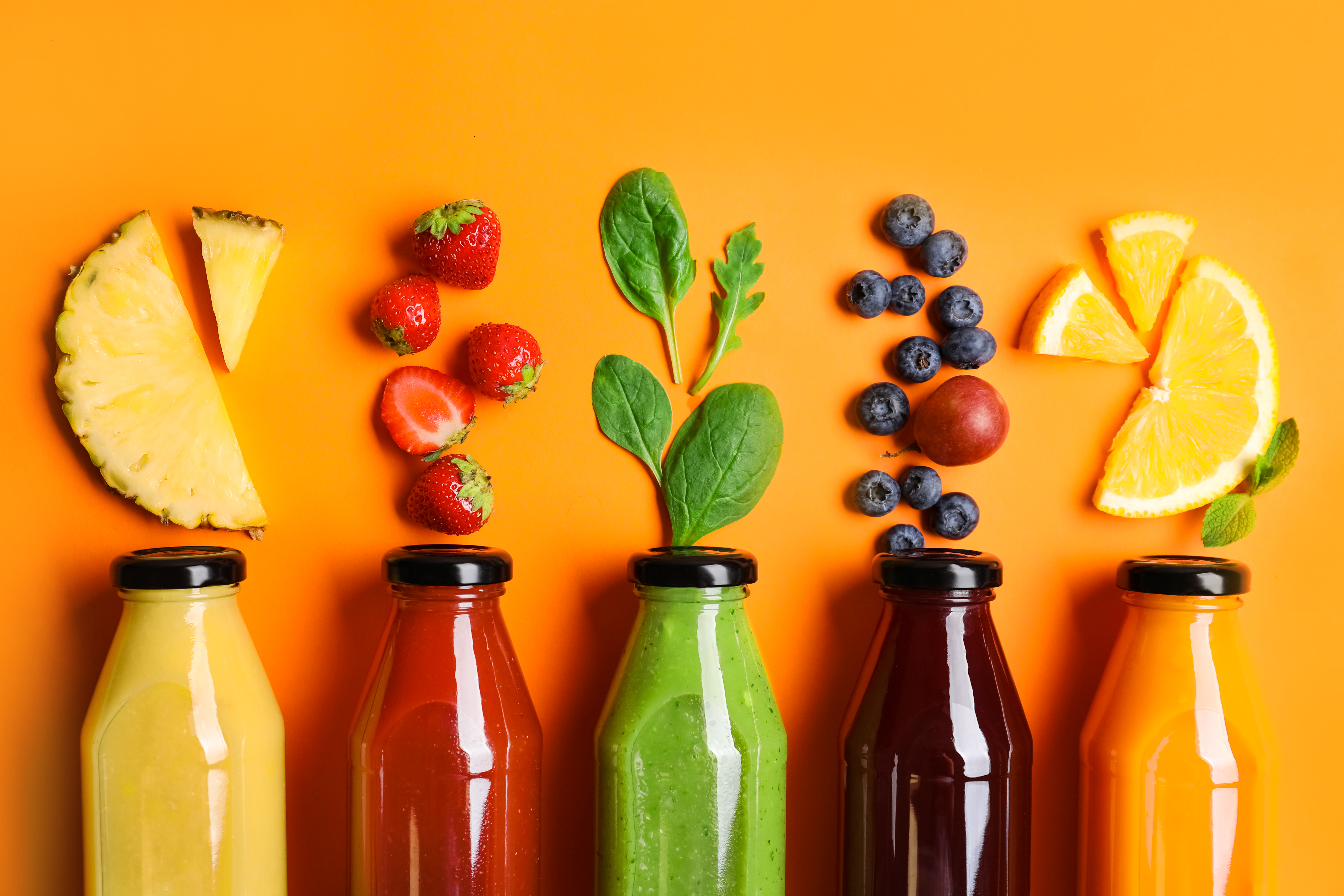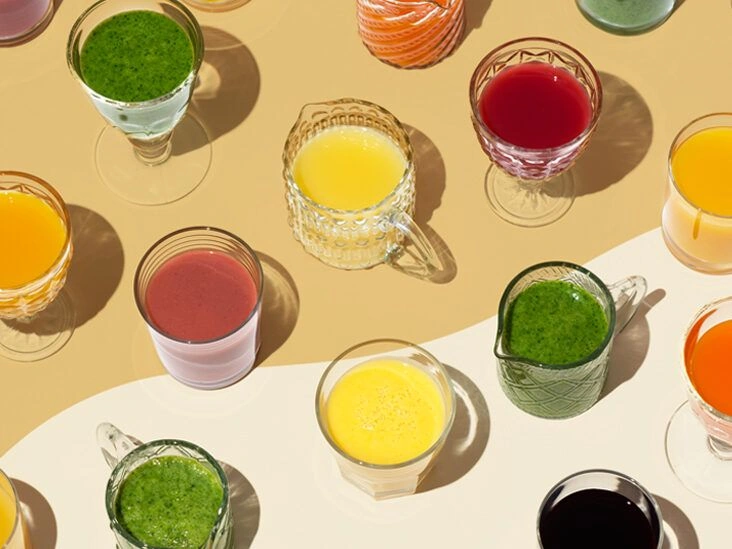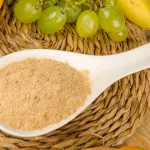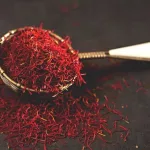Juice cleanses are a form of short-term detox regimen that involve consuming only fruit and vegetable juices. While some people report benefits, these programs also carry potential downsides.
According to the , individuals undertake juice diets to:

- lose weight
- eliminate toxins from the body
- improve skin appearance
Yet there is limited scientific backing for these claims, and juice cleanses may even pose risks.
Continue reading to understand more about juice cleanses, possible advantages and drawbacks, and safer alternatives to support your wellbeing.
What potential benefits do juice cleanses offer?
A 2020 review’s authors estimate that ultra-processed foods account for up to of the typical American diet. Consumption of these foods has been linked to multiple health problems, including:
- cardiovascular disease
- increased body weight
- cancer
- type 2 diabetes
- irritable bowel syndrome
- depression
Ultra-processed products tend to be high in added sugars, unhealthy fats, and refined carbs — calorie-dense but low in nutrients.
In contrast, juice cleanses are often low in calories and deliver a variety of vitamins, minerals, and phytonutrients.
Below are some of the possible health-related effects attributed to juicing.
Juicing and general health
Fruits and vegetables contain numerous bioactive compounds that support overall health and may help prevent chronic disease.
For instance, they provide phenolic compounds with antioxidant, immune-supporting, and antibacterial actions. Certain fruit juices may help reduce blood pressure and cholesterol.
Juicing and weight loss
Some evidence suggests juice cleanses can alter gut microbiota in ways associated with weight reduction.
In a , a 3-day regimen of only juice changed gut bacterial profiles in 20 healthy adults, and participants experienced notable weight loss that persisted after the study. The researchers proposed that shifts in gut flora might explain these effects.
However, participants consumed only 1,310 calories per day in that study — below the daily calorie recommendations from the “” for maintaining weight (about 1,600 calories for adult females and 2,000 for adult males).
Therefore, the observed weight loss could be a consequence of calorie restriction.
Juicing as a ‘detox’
There is scant scientific support for the claim that juices detoxify the body by flushing out toxins.
Some detox interventions have shown potential to enhance liver detox processes and remove environmental pollutants, but a notes that these clinical trials often suffer from methodological issues and small sample sizes.
Much of the supporting data comes from animal models, which don’t always translate directly to humans.
Juicing and skin health
A indicates that citrus-based juices might protect skin by lowering oxidative stress. Likewise, pomegranate juice has been reported to reduce indicators of skin aging.
However, these findings are primarily from animal studies; additional human research is needed to confirm these effects.
What are the potential harms of juice cleanses?
Many people on juice cleanses do not consume sufficient solid food to meet their energy requirements. This calorie shortfall can cause increased hunger and energy deficits, leading to symptoms such as:
- fatigue
- headaches
- irritability
Juices also contain less dietary fiber than whole fruits and vegetables. Some suggests reduced fiber can help the body absorb nutrients from juices more readily.
Nonetheless, dietary fiber provides many health benefits — it supports blood sugar control, cardiovascular health, and gut function, and is linked to a lower risk of colorectal cancer.
Many commercial juices are also high in added sugars, which have been associated with:
- weight gain
- obesity
- diabetes
- tooth decay
Juicing and disordered eating risk
Engaging in juice cleanses can affect a person’s relationship with food.
An intense focus on “healthy” foods and avoidance of perceived “unhealthy” items can contribute to orthorexia nervosa.
Consumption of fruit juices has also been linked with bulimia nervosa in some reports.
Healthier ways to nourish yourself
Organs like the liver, kidneys, and lungs are typically effective at removing harmful substances without extreme measures.
That said, here are practical, evidence-informed strategies to support these systems and your overall health:
- eat a balanced, anti-inflammatory diet
- get of physical activity each week
- limit added sugars
- opt for smoothies instead of clear juices
- stay hydrated — aim for six to eight glasses of water daily
- choose nutrient-dense foods you actually enjoy
- identify triggers for emotional eating
- consider intermittent fasting if appropriate
- practice mindful eating
- control portion sizes
Frequently asked questions
Do you really lose weight on a juice cleanse?
You can lose weight while on a juice cleanse, but much of it may be water rather than fat. After several days, you may also begin to lose muscle mass. Preserving muscle during weight loss is important for long-term health.
How much weight can you lose on a 3-day juice cleanse?
Weight loss varies between individuals and depends on factors such as:
- starting body weight
- level of physical activity
- calorie intake during the cleanse
A 2017 study’s authors reported participants lost up to after a 3-day juice cleanse.
Takeaway
A diet rich in whole foods is foundational for health and disease prevention. Juices can supplement a balanced diet, but they should not supplant solid foods.
Evidence supporting juice cleanses is limited, and these practices are not suitable for everyone; they may foster unhealthy eating patterns or contribute to eating disorders.
If you’re worried about your diet, consult a healthcare provider or a registered dietitian who can help craft an appropriate plan for you.


















Leave a Reply
You must be logged in to post a comment.